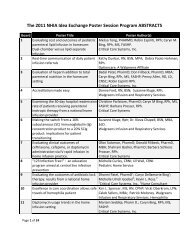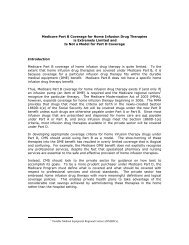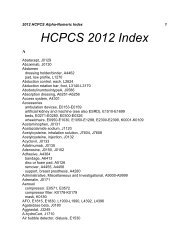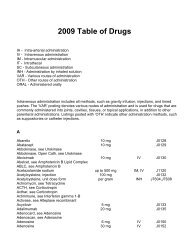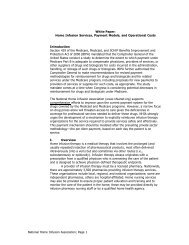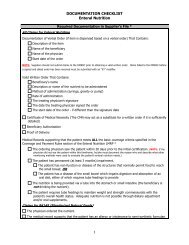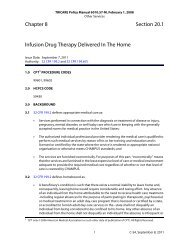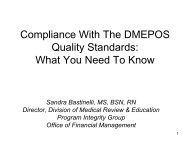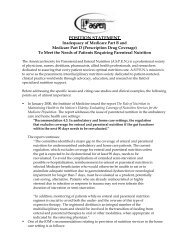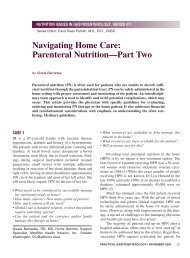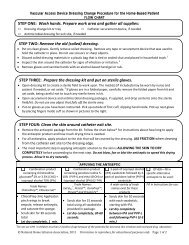Kaiser Family Foundation Survey on State Medicaid Managed Care ...
Kaiser Family Foundation Survey on State Medicaid Managed Care ...
Kaiser Family Foundation Survey on State Medicaid Managed Care ...
- No tags were found...
Create successful ePaper yourself
Turn your PDF publications into a flip-book with our unique Google optimized e-Paper software.
Looking ahead: <strong>Medicaid</strong> managed care expansi<strong>on</strong> and health reformKey Secti<strong>on</strong> Findings: <strong>State</strong>s expect to rely increasingly <strong>on</strong> managed care to serve <strong>Medicaid</strong> beneficiaries.Severe budget pressures remain a key challenge for states, and new demands associated withhealth reform also emerge as issues.While some states see barriers to <strong>Medicaid</strong> MCOs becoming Exchange plans, others expectMCOs to seize the Exchange as a market opportunity.Key health reform implicati<strong>on</strong>s for <strong>Medicaid</strong> managed care are yet to come into focus in manystates.Under the ACA, beginning in 2014, <strong>Medicaid</strong> eligibility will expand to reach nearly all Americans underage 65 with income below 133 percent of the federal poverty level, and others up to 400 percent of thepoverty level will be eligible for subsidies to purchase coverage offered through new health insuranceExchanges. An estimated 16 milli<strong>on</strong> additi<strong>on</strong>al people – mostly, uninsured adults – are expected to gain<strong>Medicaid</strong> coverage by 2019, and a similar number will gain coverage through the Exchanges. The healthreform law envisi<strong>on</strong>s seamless transiti<strong>on</strong>s and coordinati<strong>on</strong> between coverage programs when peoplemove from <strong>on</strong>e to the other due to changes in their income or other circumstances.Although it is widely expected that managed care will play a growing role in <strong>Medicaid</strong> under healthreform, until this survey, there has been no systematic assessment of states’ plans in this regard, or ofthe capacity of their MCOs to absorb new <strong>Medicaid</strong> enrollment. To gauge how prepared states are forthe <strong>Medicaid</strong> expansi<strong>on</strong> and the coordinati<strong>on</strong> challenges ahead, the survey asked states that c<strong>on</strong>tractwith MCOs several questi<strong>on</strong>s about the future of <strong>Medicaid</strong> managed care under health reform.<strong>State</strong>s expect to rely more <strong>on</strong> managed care in the near term. C<strong>on</strong>tinued budget pressures and interestin improving service delivery and payment systems are fueling states’ plans to expand the use ofmanaged care in <strong>Medicaid</strong>. In all, 27 states (of 45 resp<strong>on</strong>ding) indicated that they expect to rely <strong>on</strong><strong>Medicaid</strong> managed care to a greater extent. Of these 27 states, six specified that they have plans tomandate managed care enrollment for additi<strong>on</strong>al <strong>Medicaid</strong> populati<strong>on</strong>s (California, Kentucky, Louisiana,Michigan, New Jersey, and South Carolina), and four reported that they have plans to expand managedcare to additi<strong>on</strong>al geographic areas (Florida, Kentucky, Texas, and Virginia).<strong>State</strong>s see significant issues, challenges, and opportunities in the next couple of years. <strong>State</strong> budgetstrains and enrollment increases are both challenges that states cited frequently. The lingeringeffects of the recessi<strong>on</strong> – reduced tax revenues, high unemployment, and high demand for healthand human services programs (<strong>Medicaid</strong>, in particular) – all c<strong>on</strong>tinue to generate intense pressure <strong>on</strong>states already struggling to meet competing needs with limited resources.<strong>State</strong>s also identified c<strong>on</strong>cerns about new demands <strong>on</strong> their capacity stemming from health reform,al<strong>on</strong>g with other issues. Increased <strong>Medicaid</strong> enrollment, adequacy of provider networks, Exchangedevelopment, and development of systems for claiming the proper federal matching rate weream<strong>on</strong>g the challenges states menti<strong>on</strong>ed. <strong>State</strong>s also cited a need for more flexibility to integrate carefor dual eligibles. Individual states identified several other issues and pressures, including the need49



